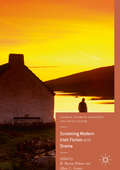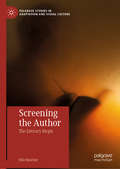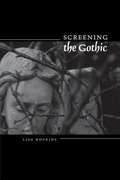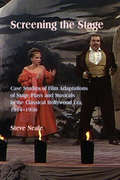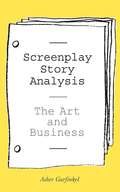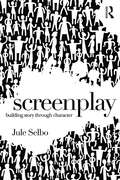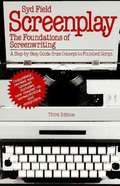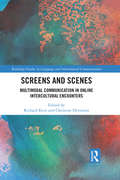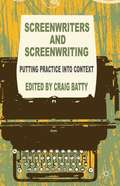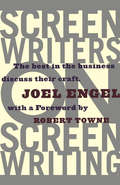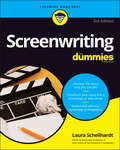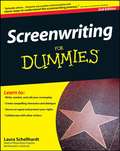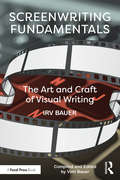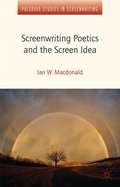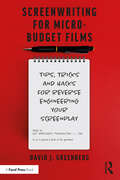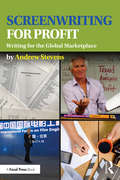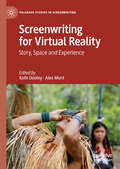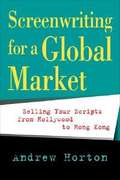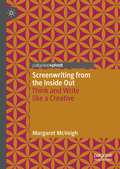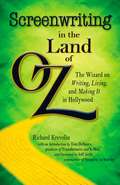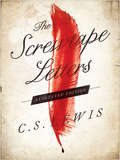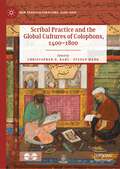- Table View
- List View
Screening Modern Irish Fiction and Drama
by R. Barton Palmer Marc C. ConnerThis book offers the first comprehensive discussion of the relationship between Modern Irish Literature and the Irish cinema, with twelve chapters written by experts in the field that deal with principal films, authors, and directors. This survey outlines the influence of screen adaptation of important texts from the national literature on the construction of an Irish cinema, many of whose films because of cultural constraints were produced and exhibited outside the country until very recently. Authors discussed include George Bernard Shaw, Oscar Wilde, Liam O'Flaherty, Christy Brown, Edna O'Brien, James Joyce, and Brian Friel. The films analysed in this volume include THE QUIET MAN, THE INFORMER, MAJOR BARBARA, THE GIRL WITH GREEN EYES, MY LEFT FOOT, THE PICTURE OF DORIAN GRAY, THE SNAPPER, and DANCING AT LUGHNASA. The introduction features a detailed discussion of the cultural and political questions raised by the promotion of forms of national identity by Ireland's literary and cinematic establishments.
Screening the Author: The Literary Biopic (Palgrave Studies in Adaptation and Visual Culture)
by Hila ShacharThis book is the first comprehensive analysis of the contemporary representation of the author on screen. It does this through two main approaches: by looking at how biographies of well-known authors in Western culture have been adapted onto the film and television screen; and by examining the wider preoccupation with the idea of what the ‘author persona’ means in broader economic, cultural, industrial, and ideological terms. Drawing from current debates about the uses of the heritage industry and conventions of the Hollywood biopic and celebrity culture, this book re-frames the analysis of the author on screen in contemporary culture and theorises it under its own unique genre: the ‘literary biopic’. With case studies including adaptations of the biographies and cultural personas of William Shakespeare, Jane Austen, Oscar Wilde, Sylvia Plath, Virginia Woolf, and Allen Ginsberg—to name a few–this book examines how and why the author continues to be a prominent screen and cultural preoccupation.
Screening the Gothic
by Lisa HopkinsFilmmakers have long been drawn to the Gothic with its eerie settings and promise of horror lurking beneath the surface. Moreover, the Gothic allows filmmakers to hold a mirror up to their own age and reveal society's deepest fears. Franco Zeffirelli's Jane Eyre, Francis Ford Coppola's Bram Stoker's Dracula, and Kenneth Branagh's Hamlet are just a few examples of film adaptations of literary Gothic texts. In this ground-breaking study, Lisa Hopkins explores how the Gothic has been deployed in these and other contemporary films and comes to some surprising conclusions. For instance, in a brilliant chapter on films geared to children, Hopkins finds that horror resides not in the trolls, wizards, and goblins that abound in Harry Potter, but in the heart of the family. <P><P> Screening the Gothic offers a radical new way of understanding the relationship between film and the Gothic as it surveys a wide range of films, many of which have received scant critical attention. Its central claim is that, paradoxically, those texts whose affiliations with the Gothic were the clearest became the least Gothic when filmed. Thus, Hopkins surprises readers by revealing Gothic elements in films such as Sense and Sensibility and Mansfield Park, as well as exploring more obviously Gothic films like The Mummy and The Fellowship of the Ring. Written in an accessible and engaging manner, Screening the Gothic will be of interest to film lovers as well as students and scholars.
Screening the Stage: Case Studies of Film Adaptations of Stage Plays and Musicals in the Classical Hollywood Era, 1914-1956
by Steven NealeIntroduced by a comprehensive account of the factors governing the adaptation of stage plays and musicals in Hollywood from the early 1910s to the mid-to-late 1950s, Screening the Stage consists of a series of chapter-length studies of feature-length films, the plays and musicals on which they were based, and their remakes where pertinent. Founded on an awareness of evolving technologies and industrial practices rather than the tenets of adaptation theory, particular attention is paid to the evolving practices of Hollywood as well as to the purport and structure of the plays and stage musicals on which the film versions were based. Each play or musical is contextualized and summarized in detail, and each film is analyzed so as to pinpoint the ways in which they articulate, modify, or rework the former. Examples range from dramas, comedies, melodramas, musicals, operettas, thrillers, westerns and war film, and include The Squaw Man, The Poor Little Rich Girl, The Merry Widow, 7th Heaven, The Cocoanuts, Waterloo Bridge, Stage Door, I Remember Mama, The Pirate, Dial M for Murder and Attack.
Screenplay Story Analysis: The Art And Business
by Asher GarfinkelSometimes it seems like everybody's writing a screenplay. But who reads those screenplays? Professional story analysts, that's who. Screenplay Story Analysis explains exactly how to become a professional story analyst.<P><P> Along with a basic how-to on writing a story analysis-or "coverage"-this book explains the techniques and thought processes involved in reading and evaluating a screenplay. Get familiar with terms, techniques, and general story elements. Master standard coverage format and content. Find guidelines for practicing coverage and getting work as a professional story analyst. With a foreword by Craig Perry, producer of American Pie, Final Destination, and other successful movies, and quotes from industry pros from top entertainment companies including ABC and Paramount Pictures, this is the essential guide for breaking into the business.
Screenplay: Building Story Through Character
by Jule SelboScreenplay: Building Story Through Character is designed to help screenwriters turn simple or intricate ideas into exciting, multidimensional film narratives with fully-realized characters. Based on Jule Selbo’s unique 11-step structure for building story through characters, the book teaches budding screenwriters the skills to focus and shape their ideas, turning them into stories filled with character development, strong plot elements based on obstacles and conflicts, and multifaceted emotional arcs. Using examples and analysis from classic and contemporary films across a range of genres, from The Godfather to Guardians of the Galaxy, Selbo’s Screenplay takes students inside the scriptwriting process, providing a broad overview for both beginners and seasoned writers alike. The book is rounded out with discussion questions, writing exercises, a guide to the business of screenwriting, in-depth film breakdowns, and a glossary of screenwriting terms.
Screenplay: The Foundations of Screenwriting (Third Edition)
by Syd FieldHere are easily understood guidelines to make film writing accessible to novices and to help practiced writers improve their scripts. Syd Field pinpoints the structural and stylistic elements essential to every good screenplay. He presents a step-by-step, comprehensive technique for writing the script that will succeed. Why are the first ten pages of your script crucially important? How do you collaborate successfully with someone else? How do you adapt a novel, a play, or an article into a screenplay? How do you market your script?
Screens and Scenes: Multimodal Communication in Online Intercultural Encounters (Routledge Studies in Language and Intercultural Communication)
by Richard Kern Christine DevelotteThis book examines the relationships between online visual interfaces and language use in educational contexts and the features that underpin them to explore the complex nature of online communication and its implications for educational practice. Adopting a case study approach featuring a global range of examples, the volume uniquely focuses on multimodal intercultural interactions, with a particular interest in videoconferencing, to look at how they project and reflect particular cultural values and tendencies concerning language use and how they elucidate the complex cultural identifications and affiliations inherent in intercultural encounters. The book employs a diverse range of theoretical and research frameworks to highlight the dynamic connections between digital technology, social life, and language use, and the ways in which they can inform language education, making this an ideal resource for students and scholars in applied linguistics, communication studies, media studies, information studies, and education.
Screenwriters and Screenwriting
by Craig BattyScreenwriters and Screenwriting is an innovative, fresh and lively book that is useful for both screenwriting practice and academic study. It is international in scope, with case studies and analyses from the US, the UK, Australia, Japan, Ireland and Denmark. The book presents a distinctive collection of chapters from creative academics and critical practitioners that serve one purpose: to put aspects of screenwriting practice into their relevant contexts. Focusing on how screenplays are written, developed and received, the contributors challenge assumptions of what 'screenwriting studies' might be, and celebrates the role of the screenwriter in the creation of a screenplay. It is intended to be thought provoking and stimulating, with the ultimate aim of inspiring current and future screenwriting practitioners and scholars.
Screenwriters on Screen-Writing: The Best in the Business Discuss Their Craft
by Joel EngelBefore any lights, camera, or action, there's the script--arguably the most important single element in filmmaking, and Screenwriters on Screen-Writing introduces the men and women responsible for the screenplays that have produced some of the most successful and acclaimed films in Hollywood history. In each interview, not only do the writers explore the craft and technique of creating a filmic blueprint, but they recount the colorful tales of coming up in the ranks of the movie business and of bringing their stories to the screen, in a way that only natural-born storytellers such as themselves can. These and other screenwriters have garnered the attention of the movie-going population not only with their words, but with headlines announcing the sales of their scripts for hundreds of thousands and sometimes millions of dollars.Anyone interested in writing, making, or learning about movies will enjoy reading this fascinating behind-the-scenes compendium that brings together some of the most prominent and talented screenwriters in modern-day filmmaking. Screenwriters interviewed include:Bruce Joel Rubin (Ghost), Ernest Lehman (North by Northwest, Who's Afraid of Virginia Woolf?), Amy Holden Jones (Indecent Proposal), Ted Tally (The Silence of the Lambs), Horton Foote (To Kill a Mockingbird, Tender Mercies), Andrew Bergman (The In-Laws), Caroline Thompson (Edward Scissorhands), Richard LaGravenese (The Fisher King), and Robert Towne (Chinatown, Shampoo).
Screenwriting For Dummies
by Laura SchellhardtSuspend your disbelief—you can make it as a screenwriter Behind every blockbuster film and binge-worthy show, there’s a screenwriter—and that writer could be you! Turn your brainstorming sessions into dynamic scripts with the help of Screenwriting For Dummies. Create believable worlds with relatable characters, gripping dialogue, and narrative structures that will keep even the showbiz bigwigs on the edge of their seats. Once you’ve polished your product, it’s time to bring it to market. This book is full of advice that will help you get eyes on your screenplays so you can sell your work and find success as a screenwriter. From web series to movie musicals to feature films, this book shows you how to develop and hone your craft. Learn to think like a screenwriter and turn story ideas into visually driven, relatable scripts that will get noticed Study the elements of a story, like plot structure (beginning, middle, and end) and characterization (wait, who’s that, again?) Hop over the hurdle of writer’s block, and tackle other obstacles that stand in the way of your scriptwriting career Get insider insight into finding an agent and meeting with studio execs, plus alternative markets for your finished work This updated edition covers the latest trends and opportunities—and there are lots of them—for today’s writers. Let Dummies help you map out your story and put your script on the road to production. Thank us when your work goes viral!
Screenwriting For Dummies, 2nd Edition
by Laura Schellhardt John LoganWrite a great script and get it into the hands of the Hollywood players! So you want to be a screenwriter? Whether you want to write a feature film or a TV script or adapt your favorite book, this friendly guide gives you expert advice in everything from creating your story and developing memorable characters to formatting your script and selling it to the studios. You get savvy industry tips and strategies for getting your screenplay noticed! The screenwriting process from A to Z -- from developing a concept and thinking visually to plotline, conflicts, pacing, and the conclusion Craft living, breathing characters -- from creating the backstory to letting your characters speak to balancing dialogue with action Turn your story into a script -- from developing an outline and getting over writer's block to formatting your screenplay and handling rewrites Prepare for Hollywood -- from understanding the players and setting your expectations to polishing your copy and protecting your work Sell your script to the industry -- from preparing your pitch and finding an agent to meeting with executives and making a deal Open the book and find: The latest on the biz, from entertainment blogs to top agents to box office jargon New story examples from recently released films Tips on character development, a story's time clock, dramatic structure, and dialogue New details on developing the nontraditional screenplay -- from musicals to animation to high dramatic style Expanded information on adaptation and collaboration, with examples from successful screenwriting duos
Screenwriting Fundamentals: The Art and Craft of Visual Writing
by Irv BauerScreenwriting Fundamentals: The Art and Craft of Visual Writing takes a step-by-step approach to screenwriting, starting with a blank page and working through each element of the craft. Written in an approachable anecdote-infused style that’s full of humor, Bauer shows the writer how to put the pieces together, taking the process of screenwriting out of the cerebral and on to the page. Part One of the book covers character, location, time-frame and dialogue, emphasizing the particularity in writing for a visual medium. Part Two of the book focuses on the narrative aspect of screenwriting. Proceeding incrementally from the idea and story outline, through plotting and writing the treatment, the workshop-in-a-book concludes with writing the First Draft. A unique emphasis on the visual elements of storytelling because the camera is always present—the screenplay must act as a guide for the director and the editor. A "workshop in a book" approach that walks the reader step-by-step through a screenplay—focusing on character, location, time frame, visual components, and transitions—with plenty of exercises that generate material for the narrative writing process. A process-oriented approach, combined with a lighthearted tone and approachable style, that allows the reader to ease into the daunting task of writing a First Draft and takes them all the way through to the end— First Draft in hand.
Screenwriting Poetics and the Screen Idea
by Ian W. MacdonaldA new, original investigation into how screenwriting works; the practices, creative 'poetics' and texts that serve the screen idea. Using a range of film, media and creative theories, it includes new case studies on the successful ITV soap Emmerdale, Hitchcock's first major screenwriter and David Lean's unfinished film, Nostromo.
Screenwriting for Micro-Budget Films: Tips, Tricks and Hacks for Reverse Engineering Your Screenplay
by David J GreenbergScreenwriting for micro-budget films can present its own challenges and this book takes the reader through all the considerations that need to be made to write an effective screenplay for a low-budget film. Drawing on his own experience, case studies from films such as Primer, Coherence and Reservoir Dogs, as well as the perspectives of working screenwriters such as Joe Swanberg and Alex Ross-Perry, Greenberg explores common pitfalls screenwriters face and suggests practical solutions. This book lays the groundworks of the realities of low-budget filmmaking and also talks through the practical aspects, such as story structure and genre considerations. Greenberg makes the process of writing a screenplay for a low-budget film accessible and creative, allowing student and independent filmmakers to tailor their writing for their films. This book is ideal for aspiring screenwriters, independent filmmakers and students of screenwriting.
Screenwriting for Profit: Writing for the Global Marketplace
by Andrew StevensThis book teaches readers how global trends define the marketplace for saleable screenplays in key international territories as well as the domestic market. Veteran writer, producer, and director Andrew Stevens gives you the insider edge you need to write for the global marketplace, sharing his decades of experience producing and financing everything from micro-budget independent films to major studio releases. In leveraging Stevens’ comprehensive experience, you will learn how to determine specific subject matter, genre, and story elements to make the most of international sales trends, and harness the power of these insider strategies to craft a screenplay that is poised to sell.
Screenwriting for Virtual Reality: Story, Space and Experience (Palgrave Studies in Screenwriting)
by Kath Dooley Alex MuntThis book is focused on screenwriting and development for virtual reality (VR). It explores a diverse range of creative approaches to the writing and screen development of VR stories and immersive audience experiences. Contributions from scholars and practitioners combine conceptual and practically orientated approaches for creating fictional and documentary media VR stories. The book evaluates, challenges and adapts existing screenwriting models and practices for immersive storytelling and grapples with the future of storytelling in the era of sophisticated computer visualization, AI and the online social metaverse. The book proposes new VR storytelling models, identifies altered relationships between creators, screen works and their audiences and demonstrates how interdisciplinary practices will be core to the future of screen storytelling.
Screenwriting for a Global Market: Selling Your Scripts from Hollywood to Hong Kong
by Andrew HortonThis book provides the practical know-how for breaking into the global marketplace. It offers specific advice on writing for screens large and small, around the world from Hollywood to New Zealand, from Europe to Russia, and for alternative American markets including Native American, regional, and experimental.
Screenwriting from the Inside Out: Think and Write like a Creative
by Margaret McVeighThis book provides aspiring screenwriters with a practical and informed way to learn how to think and write like a “creative”. It stands apart from, yet complements, other screenwriting “how to” books by connecting the transdisciplinary academic fields of screenwriting, film studies and cognitive psychology and neuroscience. Using a stepped approach, it shows the writer how to understand that how we think, shapes what we write, so that we may write better.
Screenwriting in The Land of Oz
by Richard KrevolinSet your sights on a screenwriting career--and you know you're not in Kansas anymore. With some 100,000 original screenplays vying to be among the 7,000 few made into movies every year, craft is key and competition is fierce. Enter the Wizard: Award-winning screenwriter and playwright and acclaimed writing instructor Richard Krevolin, who shows you the way to turn your good ideas into great stories, and your great stories into compelling scripts.With the writer's gift for storytelling and the professor's gift for teaching, Krevolin gives you the brains, heart, and courage you need to make it in the Emerald City of Hollywood--one yellow brick at a time.
Screenwriting in The Land of Oz: The Wizard on Writing, Living, and Making It In Hollywood
by Richard KrevolinSet your sights on a screenwriting career-and you know you're not in Kansas anymore. With some 100,000 original screenplays vying to be among the 7,000 few made into movies every year, craft is key and competition is fierce. Enter the Wizard: Award-winning screenwriter and playwright and acclaimed writing instructor Richard Krevolin, who shows you the way to turn your good ideas into great stories, and your great stories into compelling scripts.With the writer's gift for storytelling and the professor's gift for teaching, Krevolin gives you the brains, heart, and courage you need to make it in the Emerald City of Hollywood-one yellow brick at a time.
Screenwriting in the Land of Oz
by Richard KrevolinSet your sights on a screenwriting career--and you know you're not in Kansas anymore. With some 100,000 new, original screenplays vying to be among the 7,000 few made into movies every year, craft is key and competition is fierce. Enter the Wizard: Award-winning screenwriter, playwright, and acclaimed writing instructor Richard Krevolin, who shows you the way to turn your good ideas into great stories, and your great stories into compelling scripts. With the writer's gift for storytelling and the professor's gift for teaching, Krevolin gives you the brains, heart, and courage you need to make it in the Emerald City of Hollywood--one yellow brick at a time.
Screwtape Letters: Annotated Edition
by C. S. LewisOn the occasion of the 50th anniversary of C. S. Lewis’s death, a special annotated edition of his Christian classic, The Screwtape Letters, with notes and excerpts from his other works that help illuminate this diabolical masterpiece. Since its publication in 1942, The Screwtape Letters has sold millions of copies worldwide and is recognized as a milestone in the history of popular theology. A masterpiece of satire, it offers a sly and ironic portrayal of human life and foibles from the vantage point of Screwtape, a highly placed assistant to “Our Father Below.” At once wildly comic, deadly serious, and strikingly original, The Screwtape Letters comprises the correspondence of the worldly-wise devil Screwtape and his nephew Wormwood, a novice demon in charge of securing the damnation of an ordinary young man. For the first time, The Screwtape Letters will be presented in full-text accompanied by helpful annotations in a striking two-color format. These annotations will give fans a deeper, more nuanced understanding of the popular book, providing background information, explanations of terms, historical significance, and excerpts from Lewis’s other works that more fully explain the ideas in this volume. For both expert Lewis fans and casual readers, The Screwtape Letters: Annotated Edition will be a beautiful and insightful guide to a beloved classic.
Scribal Correction and Literary Craft
by Daniel WakelinThis extensive survey of scribal correction in English manuscripts explores what correcting reveals about attitudes to books, language and literature in late medieval England. Daniel Wakelin surveys a range of manuscripts and genres, but focuses especially on poems by Chaucer, Hoccleve and Lydgate, and on prose works such as chronicles, religious instruction and practical lore. His materials are the variants and corrections found in manuscripts, phenomena usually studied only by editors or palaeographers, but his method is the close reading and interpretation typical of literary criticism. From the corrections emerge often overlooked aspects of English literary thinking in the late Middle Ages: scribes, readers and authors seek, though often fail to achieve, invariant copying, orderly spelling, precise diction, regular verse and textual completeness. Correcting reveals their impressive attention to scribal and literary craft – its rigour, subtlety, formalism and imaginativeness – in an age with little other literary criticism in English.
Scribal Practice and the Global Cultures of Colophons, 1400–1800 (New Transculturalisms, 1400–1800)
by Christopher D. Bahl Stefan Hanß“This is a tour de force of sophisticated global erudition.” —Filippo de Vivo, University of Oxford, UK“In its wide global range and rich variety of studies, this expertly edited volume provides an unprecedented view into the scribal practices of diverse cultural traditions in the early modern period.” —Johanna Drucker, University of California, Los Angeles, USA“This volume finally gives the colophon the place it deserves. We see scribes and printers at work in Thailand, the Deccan, Delhi, Damascus, Antwerp, and Timbuktu.” —Konrad Hirschler, University of Hamburg, Germany“In this cross-disciplinary endeavor, ten authors tell lively and exciting stories of historical scribal practices.” —Verena Klemm, University of Leipzig, Germany This book is the first to chart the global diversity of colophons between 1400 and 1800. The volume presents a new approach to scribal cultures that expands traditional definitions. Moving from the paradigm of codicological information towards a thorough interpretation of the wider social worlds of colophons in Africa, Asia, Europe, and North America, this volume uncovers the fascinating cultural history of early modern scribes. Chapters examine how those engaging in the composition and distribution of colophons shaped scribal identities, group cultures and bookish communities in a world in which manuscripts mattered. Authors build on approaches from anthropology, cultural studies, codicology, history, and philology to offer a new conceptual framework that studies colophons as scribal practices embedded in their changing social and cultural worlds. As a new contribution to the history of the book, this volume’s global approach pushes the boundaries of what constitutes a colophon.
